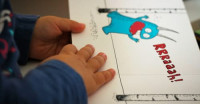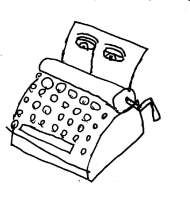
How to Format and Submit Your Children's Book Manuscript
litreactor.com – Wednesday April 2, 2025

So, you’ve finished writing your children’s book. Congratulations! You’ve taken a significant step on the road to publication. However, the journey doesn’t end here — you’ll need to polish up your manuscript before you start pitching your story to agents and publishers.
In this post, we’ll walk you through everything you need to know about getting your manuscript ready for submission, from industry-standard formatting to personalizing your query letter. Let’s get started!

eMerge literary magazine: Charles L. Templeton’s vision for amplifying emerging voices
londondaily.news – Thursday March 27, 2025

Charles L. Templeton’s journey as a literary advocate took a groundbreaking turn with the creation of eMerge, a platform that has quickly become a beacon for emerging voices in the literary world. Frustrated by the limitations and gatekeeping prevalent in mainstream publishing, Templeton founded eMerge with a simple yet powerful mission: to provide a space where underrepresented and emerging writers could have their work heard.
With a keen understanding of the challenges faced by new authors, eMerge was designed not only as a publication but as a community—one where writers, poets, and storytellers from all walks of life could come together to share their voices without fear of exclusion. Under Templeton’s visionary leadership, eMerge has become a literary magazine that embraces diversity, encourages creativity, and celebrates the power of storytelling.
What sets eMerge apart from other literary magazines is its unwavering commitment to inclusivity and its relentless pursuit of high-quality, authentic work. Templeton’s editorial direction has allowed the magazine to flourish, earning national recognition and a place in the Library of Congress Collection. This achievement is a testament to Templeton’s ability to curate meaningful content while maintaining a dedication to publishing diverse voices. eMerge doesn’t just showcase new talent; it gives emerging writers the platform they need to build lasting careers. Whether it’s through poetry, short stories, or essays, eMerge has become a trusted space for both emerging and established writers, creating an environment where creativity is nurtured and celebrated, and where every voice, no matter how unconventional, is given the opportunity to shine.

The Vanishing White Male Writer
compactmag.com – Friday March 21, 2025

t’s easy enough to trace the decline of young white men in American letters—just browse The New York Times’s “Notable Fiction” list. In 2012 the Times included seven white American men under the age of 43 (the cut-off for a millennial today); in 2013 there were six, in 2014 there were six.
And then the doors shut.
By 2021, there was not one white male millennial on the “Notable Fiction” list. There were none again in 2022, and just one apiece in 2023 and 2024 (since 2021, just 2 of 72 millennials featured were white American men). There were no white male millennials featured in Vulture’s 2024 year-end fiction list, none in Vanity Fair’s, none in The Atlantic’s. Esquire, a magazine ostensibly geared towards male millennials, has featured 53 millennial fiction writers on its year-end book lists since 2020. Only one was a white American man.
Over the course of the 2010s, the literary pipeline for white men was effectively shut down. Between 2001 and 2011, six white men won the New York Public Library’s Young Lions prize for debut fiction. Since 2020, not a single white man has even been nominated (of 25 total nominations). The past decade has seen 70 finalists for the Center for Fiction’s First Novel Prize—with again, not a single straight white American millennial man. Of 14 millennial finalists for the National Book Award during that same time period, exactly zero are white men. The Wallace Stegner Fellowship at Stanford, a launching pad for young writers, currently has zero white male fiction and poetry fellows (of 25 fiction fellows since 2020, just one was a white man). Perhaps most astonishingly, not a single white American man born after 1984 has published a work of literary fiction in The New Yorker (at least 24, and probably closer to 30, younger millennials have been published in total).

In defence of self-publishing
spectator.co.uk – Wednesday March 19, 2025

Years ago, newly triumphant from getting my first book published, I went to my parents’ house for a celebration dinner. Having duly toasted their son’s modest literary success, they then revealed that I wasn’t the new author in their social circle. An old university friend of theirs from Holland – we’ll call him Jörg – had just sent them a copy of his new book, ‘a sort of travel memoir, a bit like yours’.
This was not a comparison I welcomed. My book was about quitting my job as pot-holes correspondent on the London Evening Standard to freelance in post-Saddam Iraq – not exactly Michael Herr’s Dispatches, granted, but more gripping, I liked to think, than writing about roadworks on Streatham High Road. Jörg’s book was a self-published account of his campervanning trip the year before across America. At a hefty 500 pages long, it was twice the length of mine. And much as one can commend Dutch pensioners for their adventurous travelling spirit, Jörg was not a Theroux or Chatwin. Chapter one was devoted largely to a quiet first night in a motorway service station, and how it compared to those back home.
I thought of Jörg’s book last week, when the writer Bill Bryson railed against self-published books, which have proliferated in the era of e-publishing and Kindle. Bryson told the Times that many were ‘of no interest’, and that a glut of books about ‘some anonymous person’s life’ made it harder for genuinely talented authors to be spotted by publishers. His remarks reflect a widespread disdain for DIY authors. As the phrase ‘vanity publishing’ suggests, it’s seen as literary onanism, a dirty habit best resisted rather than indulged.
7 Writing Retreats Around the World For Emerging and Established Writers
electricliterature.com – Sunday March 9, 2025
Writing retreats offer the opportunity for writers to fully immerse themselves in their craft, free from the distractions of daily life. These getaways combine inspiring locations, structured time, and a like-minded community to reignite creativity and boost productivity. Whether you’re seeking solitude to finish a manuscript or a collaborative environment to workshop ideas, a retreat can serve as the perfect catalyst.
I run a writer’s retreat called Studio Luce, steps away from the black sand beach of El Paredón, on the Pacific coast of Guatemala. The retreat is hosted in a 3-bed villa, featuring a newly built writing studio, alongside a tropical garden and pool. We offer week-long author-led retreats throughout the year, bringing together small groups of writers to focus on their craft.
While some retreats are well-known—particularly in the U.S.—there are many hidden gems scattered around the world that offer equally transformative experiences. Here are 7 unique international writing retreats for when you need to get away and focus on your writing:

The Trials and Tribulations of Writing Submissions: A Chat with Professor Emma Törzs and Professor Ben Voigt
macalester.edu – Saturday March 8, 2025

It is March 7th, and if you’ve been regularly scanning the English department emails, you’ll know that today is your final day to submit to the department’s three esteemed writing contests. Today, writers, the arduous two-month waiting period commences. Rather than fret over your submissions, The Words is here to offer solace in the wisdom of Professor Emma Törzs ’09 and Professor Ben Voigt ’10, two of the department’s very own contest winners and talented authors.
Professor Emma Törzs won the Harry Scherman Writing Contest in the category of Creative Prose, and Professor Ben Voigt was selected as the Macalester Finalist for the Academy of American Poets Prize.
Do you recall any part of the writing process for your submission?
B: I was working with a mentor, but I switched from fiction to poetry at the end of undergrad. I wrote this piece for an independent study, and it was inspired by and went along with an art installation. The piece was very narrative, but it had a turn near the end, a volta, and I remember thinking, “So, this is what a poem feels like.”
E: Well, my first experience of writing short stories was in college, believe it or not, in Peter Bognanni’s class. Because I started writing short fiction in creative writing classes, my experience of writing fiction was always sort of tied with the idea of deadlines and readership, which I think has actually helped me a lot. Having readers in mind, having an audience in mind, and working with deadlines is something that you continue to do long out of college if you want to keep writing.

Brilliant writing advice from famous authors
scottishbooktrust.com – Wednesday March 5, 2025

Looking for a little bit of inspiration from the greats? Author Sarah Forbes Stewart shares her favourite writing advice from some of the best writers around.
Writing! The best job in the world – but also, sometimes, the most impossible. If you’ve ever wanted to write, or you already write but are tortured by the blank page staring up at you, maybe it’s time to get some tips from the greats.
Zadie Smith
Zadie Smith, in an interview from 2010, offered this excellent nugget: 'Try to read your own work as a stranger would read it, or even better, as an enemy would.'
I like the brutality of this simple advice. We can all fall in love with our own ideas, characters and dialogue. It’s a worthwhile skill to leave some breathing space and come back to your writing with a critical eye.
F. Scott Fitzgerald
In a 1938 letter to an aspiring author, Fitzgerald wrote: 'You’ve got to sell your heart, your strongest reactions, not the little minor things that only touch you lightly, the little experiences that you might tell at dinner.'
You can write about anything you like – anything! – but you have to put your heart into it.

Eric Puchner: How to Be Funny When Writing a Novel
lithub.com – Saturday February 22, 2025

Is anything more embarrassing than trying to be funny and going splat? I sometimes think there’s an inverse relationship between trying to be funny and actual funniness. This is especially true in literature, I think. When you think of great comic novels and short stories—True Grit, Mrs. Bridge, On Beauty, anything by Joy Williams—you think, above all, of their effortlessness, how what’s funny about them is inextricable with their, well, novel-ness. They can’t fail to be funny, because they hardly seem to be trying to. They don’t strain after jokes so much as evoke the inherent funniness of life.
The philosopher Henri Bergson talks about “mechanical inelasticity”: something is funny when a person—or, I suppose, an animal—fails to adapt to a change in their surroundings. Think of the unsuspecting fellow who tries to sit down on a chair that’s been pulled out from under him. We expect someone to act a certain way, one that conforms elastically to the situation they’re in, and it’s funny when they don’t. As Simon Critchley puts it, in his book On Humor: there’s a disconnect between “expectation and actuality.”
This isn’t just a nifty, somewhat incontrovertible theory of humor. It’s a nifty, somewhat incontrovertible theory of what makes a novel or short story work. One might even say that a disconnect between expectation and actuality is the essential element of fiction. A young man wakes up as a beetle and yet worries more than anything about getting to work on time (“The Metamorphosis”); a wealthy couple insist on finishing their dinner at a country club, despite the fact that a tornado’s approaching and everyone else has fled to the basement (Mrs. Bridge). When my students complain about writer’s block, that they have no idea what to write about, I often encourage them to think of something funny that’s happened to them: not because I want their readers to laugh out loud—though there are far worse things a reader might do!—but because something that meets the criteria for funniness also meets the criteria for engaging fiction. The sound of laughter is the sound of a story succeeding.

‘Golden age’ of self-publishing for indie authors ‘no longer strictly choosing one route or the other’
thebookseller.com – Saturday February 22, 2025

There is something in the air in the self-publishing world at the moment; just ask the Alliance of Independent Authors’ (ALLi) co-founder and director Orna Ross, who has watched the sector develop over the past decade and a half. Though she still does not see traditional and self-publishing as “sitting together that much”, she believes “it’s a hugely exciting time to be an indie author”.
Former Harper Press managing director John Bond (pictured), turned CEO and co-founder of Whitefox – which launched in 2012, offering a “curated network of publishing specialists” to companies and individuals, many of whom are self-publishers – agrees.
He says: “There’s still a bit of a stigma around self-publishing, but it’s changed, because more people want to have creative control of their own books. They want to do things in a time frame that suits them, rather than hope that they will find an agent, and that the agent finds a publisher, and at some point, in the future, that book is published. New writers are saying: ‘I can do something relatively quickly and learn how to be an entrepreneurial, self-starting author.’”
This is what Monique Charlesworth, who founded Moth Books in order to publish her own (and now others’) books, wanted to do with its launch title, her book Mother Country: “I published four titles traditionally, and I worked with marvellous people, but they didn’t care like I did about the cover, about the quotes. They weren’t necessarily great at communication and publicity.”

How to Write a Novel: A 7-Step Guide
snhu.edu – Wednesday February 19, 2025

Writing a novel is a process that begins with an idea, develops through outlining and creating compelling characters and grows with a consistent writing routine and revising.
If you want to become a novelist, your first book can feel like a daunting task. But, with the right approach, it can also be a manageable process. Whether you’re starting with a vivid idea or simply a desire to tell a story, breaking the process into clear steps can help you bring your vision to life.
1. Understanding What a Novel Actually Is
A novel is a long-form work of fiction, typically spanning 250–400 pages, according to Jeremy Flagg, a dystopian and sci-fi novelist with the books "Nighthawks" and "Night Shadows" to his credit. He’s also an adjunct faculty member in the online creative writing and English program at Southern New Hampshire University (SNHU).
“Whether exploring seemingly insignificant moments of life or diving deep into the essence of what it means to be human, novels allow writers to weave expansive narratives that capture the complexities of the human experience," he said.
2. Starting With an Idea
When it comes to writing a novel, authors find inspiration in different ways.
Ideas can come from the shows you love or mundane places, said Flagg, who’s often inspired by watching crowded spaces or TV. Once it takes shape, he said, it can be developed further by imagining unique situations and building the story around them.
Choosing a topic or theme you care about makes the process more enjoyable and authentic. Beginners should write about something they are passionate about, he said.
Get the free newsletter | Submit a news item or article | Get Writers' News for your website





